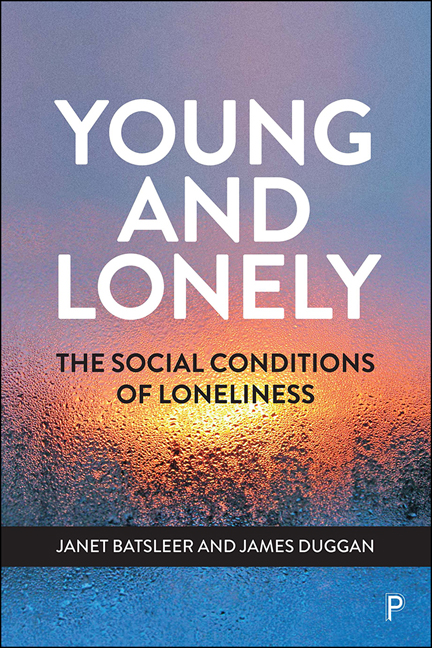Book contents
- Frontmatter
- Contents
- Notes on the Authors
- Acknowledgements
- Preface
- 1 Animate, Attune, Amplify
- 2 Finding Oneself a Loneliness Agenda
- 3 I’M New Here: Creating a New Research Project and A Young Person Led Research Agenda
- Part I The Social Conditions of Loneliness
- Part II The Experience of Loneliness
- Part III Building Friendship and Connection
- References
- Index
9 - Being Left Out
Published online by Cambridge University Press: 18 March 2021
- Frontmatter
- Contents
- Notes on the Authors
- Acknowledgements
- Preface
- 1 Animate, Attune, Amplify
- 2 Finding Oneself a Loneliness Agenda
- 3 I’M New Here: Creating a New Research Project and A Young Person Led Research Agenda
- Part I The Social Conditions of Loneliness
- Part II The Experience of Loneliness
- Part III Building Friendship and Connection
- References
- Index
Summary
On the Loneliness Playlist created at the start of the research process, Radiohead's song ‘Creep’ epitomised the rejection and loneliness of being seen as a weirdo and ostracised. The sense that ‘I don't belong here’ resonated throughout the research. Failing to be picked for a team, being the one left standing, not succeeding in a competition: these may all be commonplace experiences in children's lives, but they are no less painful for being common. The misery of a child never picked to play for a team is powerful. The song ‘Creep’ encapsulates the self-hate that is involved with the experience of not fitting in.
This chapter presents the experience of being left out and other experiences of not fitting in from a variety of perspectives. Ranging from the ways in which children and young people are horrid to one another to how adults maintain control of groups by harnessing the power of exclusion, this chapter focuses on the micropolitics of exclusion and control.
This chapter also works with the black feminist Audre Lorde's engagement with difference as a source of experience. Lorde's work is now being re-engaged with by a new generation of feminist activists and scholars and her essays and poetry are being republished (Lorde, 1984). An extract from Lorde's extensive writing on this subject of responding to difference is worth quoting at length at the beginning of this chapter:
Institutionalized rejection of difference is an absolute necessity in a profit economy which needs outsiders as surplus people. As members of such an economy, we have all been programmed to respond to the human differences between us with fear and loathing and to handle that difference in one of three ways: ignore it, and if that is not possible, copy it if we think it is dominant, or destroy it if we think it is subordinate. But we have no patterns for relating across our human differences as equals. As a result, those differences have been misnamed and misused in the service of separation and confusion. Certainly there are very real differences between us of race, age, and sex. But it is not those differences between us that are separating us.
- Type
- Chapter
- Information
- Young and LonelyThe Social Conditions of Loneliness, pp. 95 - 104Publisher: Bristol University PressPrint publication year: 2020

